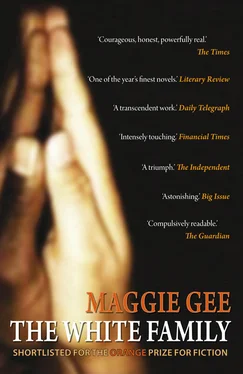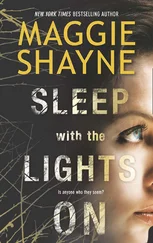The woman smiled and nodded.
Dirk stood there, doggedly ignoring her. ‘Dad,’ he said. ‘How goes it, then?’
Dirk had always lacked social graces. Once May had worried about his shyness because she thought it would stop him getting on with girls. But as Dirk grew up, there never were any girls, and sometimes she thought that he hated women. Then she’d started wondering if he liked boys, because May had read Oscar Wilde, and Thom Gunn. Once she’d found a strange magazine in his room, with photographs of black men without any clothes, but he got very cross, and said it was disgusting, he’d just brought it home to get rid of it. There were no other signs that he liked anyone at all.
‘This is Dirk,’ said May, to the painted woman. She used the most educated voice she had. ‘I am his mother. I didn’t catch your name.’
‘I think Alfred has forgotten it,’ the woman chirped, raising one eyebrow at him. ‘He hasn’t got much memory for names.’
May looked at her resentfully. Why is she gazing at my husband?
‘This is Pamela,’ Alfred said rather gruffly, with the hint of a smirk. ‘Dirk, say hallo to Pamela.’
‘So this is the famous journalist.’ Her smile was smarmy, lipsticky.
‘Oh no,’ Alfred corrected her, dismayed. ‘This is Dirk, the other one. I probably didn’t mention him … Darren’s flying in from Spain today.’
‘Lovely,’ said Pamela, vaguely, grandly ( but she’s not a lady, with that dyed hair ). ‘We had a château in Spain you know. We always wintered in Andalusia. Olives, oranges, wonderful light … it was almost like a religion, with us.’
‘Why did you come back then?’ May asked coolly.
‘That is a very long story, my dear. One I may well tell Alfred one day.’ The woman winked, elaborately. May stared open-mouthed at her turquoise eyelids.
‘He probably won’t be here,’ she said. ‘We don’t expect him to be here very long.’
‘Really?’ Pamela said, her voice almost pitying, then turned away in her bed, and read, and May wanted to say, I’m a reader too, I read the works of Alfred Tennyson, but she knew the woman thought she was stupid.
Alfred was looking very put out. Perhaps the family had let him down. Dirk wore scruffy denims and a studded leather jacket and his face was reddened by the wind. It somehow made his nose look bigger.
‘Why do you keep on talking to her ?’ Alfred hissed at May, furious. ‘Can’t you see she’s trying to read?’
Ignore the injustice, May told herself. Don’t argue with him. He’s not a well man. ‘Dirk, your father’s feeling much better —’
‘I never said I was feeling better.’
‘What did you say then?’ She wanted to weep.
‘Dad, I brought you some treacle toffees —’ Dirk stood there, clumsy, at the foot of the bed, left out of the quarrel as he usually was. They both turned to stare. The boy was giving them a present!
‘Thank you, son,’ said Alfred, startled. ‘I appreciate that. I hope you didn’t nick them —’ But Dirk’s hurt face was an annoyance when it was Darren he wanted to see. ‘Sit down, sit down, you’re blocking the light.’
Dirk sat down swiftly, patting at his hair, though bristles like that could never be untidy. May realized that he felt in the wrong. He was patting at himself to put himself right. It’s the parents’ fault if they feel like that. Yet May felt nothing could ever have been different. Do your best, she had told herself day after day, struggling to deal with her growing kids, but her best had never been good enough, and now they had come to this strange place, one by one, to be inspected.
‘How’s work?’ asked Alfred.
‘Same as usual,’ said Dirk. And that was the trouble, his mother thought. The newsagent he worked in was on Hillesden Gardens, only two hundred yards away from home. Their friend George Millington, the owner, was an asthmatic smoker with gammy legs. He had taken Dirk on for ‘work experience’ nine years ago, when Dirk was sixteen, when it wasn’t yet completely impossible to hope that he’d scrape enough GCSEs to go to college. May had stopped hoping before Alfred did.
‘How’s St George?’ Alfred asked. It was a very old joke.
‘All right. He had a turn today.’
‘You’re a good boy to look after him,’ May said quickly, comfortingly.
‘It’s disgusting,’ said Dirk. ‘He goes this horrible colour. Like he was dying, or something.’
‘You’re a good boy.’
‘He’s too old to work.’
‘He’s my age,’ said Alfred, affronted.
‘It’s different,’ said Dirk. ‘You’re not dying, are you.’ There was an uncertain silence, then he carried on. ‘I’m worried he’s going to peg out in my arms.’
‘George has been good to you, young man.’
‘Has he, Dad?’ Dirk went white around the nostrils. ‘You don’t know what it’s like in that shop. He smokes non-stop. I mean non-stop . I come out of there, I stink of smoke. Every time he coughs, he starts sicking up his guts. And when he’s not smoking, he’s bloody wheezing. He doesn’t do a shagging stroke —’
‘Language,’ said May. ‘George is fond of you,’ she added, suddenly afraid that Pamela was listening. ‘He must have got fond of you, I’m sure. Not having any sons of his own.’ (She dreamed that George would leave Dirk the shop, and he’d be all right for the rest of his life. Plus Dirk could afford to leave home, at last. They’d be left in peace, her and Alfred — Not that she wanted to get rid of him, of course.)
‘He hates me,’ said Dirk, simply. ‘He couldn’t manage without me, that’s all. I do all the work. He gets all the money.’
‘Of course he doesn’t hate you,’ said Alfred sternly. ‘Course he doesn’t. He’s my oldest friend.’
‘Have you managed to get rid of the Christmas stock?’ May was determined to turn the conversation.
‘The charity ones were rubbish, this year. No one round our way wants fancy things with otters on, they look at them and think they’re rats —’
‘Well I’m quite ecological,’ May interrupted him, indignant. ‘I bought two boxes of otters, dear.’
‘We still got lumbered with twenty-three boxes. Chocolates were quite good this year though. No thanks to George. He can’t think beyond Cadbury’s —’
‘Cadbury’s were always good enough for us,’ said Alfred.
‘Point I’m making is, people want Belgian.’
‘Good English chocolates. That’s what you want.’
‘What are you doing with these, then?’ asked Dirk, triumphant, pointing to the giant white-and-gold box that Shirley had left on the bedside table. “Best Belgian Chocolates”, it says, look, there.’
‘That’s Shirley, that is,’ said Alfred. ‘I can’t stop her wasting her money.’
‘She was looking very smart. She always does.’ May couldn’t resist a glance at Dirk’s dirty jeans.
‘These are my work clothes,’ he said, flushing. ‘I had to come here straight from work. We have to stay open late because the frigging Pakis do.’
‘Will you shush,’ May hissed, one eye on Pamela. ‘Shirley asked after you. She always does.’ (Then she thought about it, and realized she didn’t.)
Alfred’s voice got that preachy sound. ‘You always used to be so close to your sister.’
Dirk glowered at him. ‘You know what happened. It was you that said it, we had to make a stand.’
In a small clear voice that seemed to come from a dream in which she was someone stronger and braver, May said, ‘I liked Kojo. And I like Elroy. And Kojo was very good to you. You forget how many times you got your tea round at their house.’ She ran out of steam, surprised at herself.
Читать дальше












